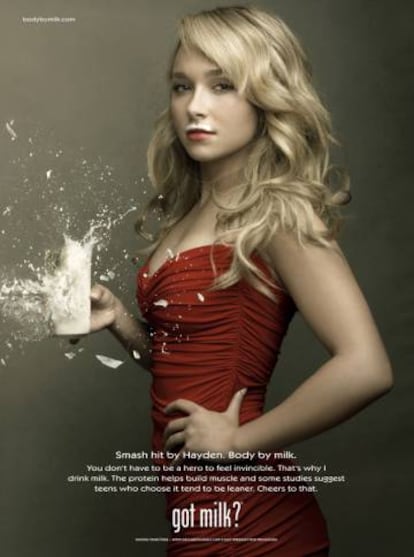This is the milk! Why is Spain obsessed with ‘leche’ expressions?
Non-Spaniards are often nonplussed by the rich variety of ways in which Spaniards use the word

The Spanish Royal Academy (RAE), the body that oversees use of the Spanish language, has nine meanings for the word leche and more than 40 idioms employing it. Clearly, leche is much more than the milk Spain keeps in its refrigerators: it can also be a cosmetic product, a vulgar way to refer to semen, a punch in the face, and even good luck in some Latin American countries like Ecuador, Mexico, El Salvador and Venezuela.
This predilection for expressions that use leche begs the question: why are Spaniards, in particular, so linguistically obsessed with milk?
Spaniards crap on everything: in the sea, on the mother that bore them, on the number 10...
“A language’s phraseology is very slippery terrain, and it is easy to go wrong with false etymological origins,” warns Elena Zamora, technical director at the RAE’s Lexicography Institute.
What’s obvious is that “nearly all of these [expressions] are used at a colloquial and vulgar level, and used to add emphasis and expressiveness to the spoken language,” adds Celia Villar, a lexicographer at the language foundation Fundéu.
Zamora agrees: “At the colloquial level it is very common to find catch-all words that yield expressions with very different meanings. Sometimes even the same expression can have opposite meanings depending on the context and intonation.”

Villar goes out on a limb by venturing that some of these expressions have to do with the most fundamental of reasons: “It would seem that their origin lies in the belief that we acquire character and personality traits through our mother’s milk as an infant.”
But there are other meanings whose origin is less clear. For example:
- Mala leche (bad milk)
To have bad milk is to be in a bad mood or to be ill-tempered, and this particular expression derives from maternal milk. In the old days, people believed that babies absorbed personality traits through the milk they drank, and that is why wet nurses were carefully selected to make sure that they would not pass on their bad milk to the infant. In time, doctors noticed higher mortality rates among children who grew up on this system, and they began recommending that mothers suckle their own babies. This also ended the practice of blaming others for kids who grew up to be rebellious.
- Ser la leche (to be the milk)
Just like most other expressions on this list, leche can easily be replaced with hostia (the host or consecrated wafer) without any change to the overall meaning. And unlike the previous idiom, this one has a positive meaning...or maybe not. According to the RAE, ser la leche means to be extraordinary, but one can be extraordinarily good or extraordinarily bad, and let’s not forget that sarcasm is one of Spain’s great national sports. Consider the sentence: Este tío es la leche (this guy is the milk). It could be said with a positive or a negative spin. The clues are in the context, and so a word of advice: do not use it in a Whatsapp conversation unless you add an army of emoticons.
- A toda leche (at full milk)

This is where we address a series of expressions whose origins lexicographers are uncertain about. In this case, leche can have two completely separate meanings: speed and volume. The difference lies in the preceding verb. If it is a verb that entails movement, then it means at full speed, as in Conducir a toda leche or to drive very fast. If we are talking about a sound, then it means at full volume, as in tenía la música a toda leche or he had the music on at full volume. Vehicles driving at full milk with the radio blaring at full milk are very likely to end up using another milk expression: darse una leche, which (in this case) means to crash.
- La leche (The milk)
The article that precedes the noun is critical, as it marks the difference between the white liquid produced by the mammary glands of female mammals and la leche, which means very. To know the milk (saber la leche) about a given subject is to be very knowledgeable about it, while to be la leche de listo is to be really smart.
- A mala leche (With bad milk)
The origin is the same as the simpler mala leche, but there is a subtle difference. If someone does something a mala leche, it’s not just because they’re in a bad mood. It’s because they really had bad intentions in the first place. It is used with the prepositions a and con. Best to stay away from such people.

- Cagarse en la leche (to shit in the milk)
Spaniards crap on everything: in the sea, on the mother that bore them, on the number 10...and of course in milk as well. Originally it was longer: cagarse en la leche que te han dado or to shit on the milk that you were fed, which again harks back to its breastfeeding origins. Like many other expressions used regularly in Spanish, the abbreviated form has become more popular, and it must be said in its favor that it sounds more forceful this way. If we’re going to be vulgar, let us be so convincingly.
- De la leche (of the milk)
Context is also important in this case – or did you think that Cervantes’ language was going to be simple? At its most precise, it means incredible or tremendous. One can have un cabreo de la leche (to be incredibly mad) or una suerte de la leche (to have tremendous good fortune). To create a confusing effect, try saying that I’ve had a day of the milk because my boss is the milk.
- ¡Leches! (Milks!)

Do you remember how many times you asked an Italian acquaintance about the exact meaning of the word prego? Well here is your chance to get back at them. Now here is a catch-all phrase that works well in every situation, from amazement to surprise, admiration or even aggravation. It helps exteriorize just about every feeling in just six letters, and listeners are expected to understand perfectly. The worst part is, they usually do. God bless body language.
- Darse una leche (To give oneself a milk)
It was first acknowledged by the RAE dictionary in 1984, as a vulgar expression. It means to hurt oneself by bumping or crashing into something, and can be combined with a multitude of verbs such as meter(se) or pegar(se).
English version by Susana Urra.
Tu suscripción se está usando en otro dispositivo
¿Quieres añadir otro usuario a tu suscripción?
Si continúas leyendo en este dispositivo, no se podrá leer en el otro.
FlechaTu suscripción se está usando en otro dispositivo y solo puedes acceder a EL PAÍS desde un dispositivo a la vez.
Si quieres compartir tu cuenta, cambia tu suscripción a la modalidad Premium, así podrás añadir otro usuario. Cada uno accederá con su propia cuenta de email, lo que os permitirá personalizar vuestra experiencia en EL PAÍS.
¿Tienes una suscripción de empresa? Accede aquí para contratar más cuentas.
En el caso de no saber quién está usando tu cuenta, te recomendamos cambiar tu contraseña aquí.
Si decides continuar compartiendo tu cuenta, este mensaje se mostrará en tu dispositivo y en el de la otra persona que está usando tu cuenta de forma indefinida, afectando a tu experiencia de lectura. Puedes consultar aquí los términos y condiciones de la suscripción digital.









































